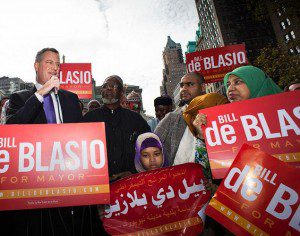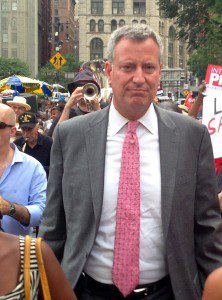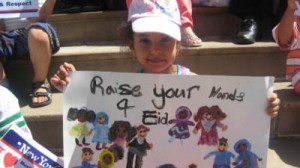
Great news coming out of New York City – Mayor Bill de Blasio announced on WNYC’s “Brian Lehrer Show” on Monday that he’s “moving forward” with a nearly decade-long push to close schools for the Lunar New Year and for the Muslim holidays of Eid-ul-Fitr (occurring at the end of Ramadan) and Eid-ul-Adha (which coincides with the annual conclusion of the Hajj pilgrimage).
“It’s complicated in terms of logistics and school calendar and budget,” de Blasio said. “But it’s something I want to get done in a reasonable time frame.” Regarding the Hindu festival of Diwali, de Blasio hadn’t come to a decision on that. Many prominent New York Muslims spent years pushing for the school closures under the Bloomberg administration, but the former mayor had opposed the change, saying that he didn’t want kids to miss more school.
It’s especially heartening to read about this today, to see the fruition of years of hard work by the New York Muslim community to bring this about through the proper channels and through their engagement in the civic and political process. Just last week over on Altmuslim we published a piece by Laila Alwala and Wardah Khalid explaining why national petitions to make schools close for Muslim holidays was a rather fruitless endeavor:
“Supporters of the petition have pointed to school holidays given to Jewish children as evidence of the need for Muslim holidays as well. While this may be true, the fact is that these holidays are decided by local school boards, not the federal government. Frankly speaking, President Obama doesn’t have much to do with your neighbor getting Hanukkah off because it is not technically a federal holiday. If you live in an area where there are enough Muslim children to warrant a school holiday, then your school board, not the White House, should be petitioned.
A little political savvy couldn’t hurt, either. Democracy is a representative institution, but the proper channels must be utilized to make it effective. If everyone went straight to the top for their varying concerns, then it would be an autocracy, not a democracy. This absolutely goes for those Muslims who have argued that as American citizens, they have the right to petition the White House whenever they like and that there is no harm in trying to raise awareness. Yes, you are free to do that, but odds are White House officials will send you straight back to your local school board to raise awareness there.”
They go on to say:
“Thus, it is our inherent religious duty to get involved with the entire political process — not simply through signing a quick petition, but through voting, expressing our needs and desires to our representatives, running for office and giving back to the greater American diaspora. And this should not necessarily be Muslim-specific issues, either. If we want to enjoy the right to petition due to our citizenship and tax contributions, we must accept the responsibility that comes with it.
There’s a saying that goes, ‘you aren’t at the table, you are on the table.’ As Muslim Americans, we are still for the most part being served up on the table. It’s up to us to make sure that we begin taking our place at the table — for more than simply school holidays. Stand up and get involved: America is your community, too.”
I’d say New York City’s Muslim-American community leaders and activists and the larger community are a great example of this – working within the system, helping to get de Blasio elected, pushing and pushing to have Muslim holidays recognized by the New York City school board and persistently taking their “place at the table.”
Let’s learn from their hard work.












